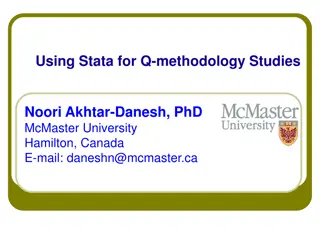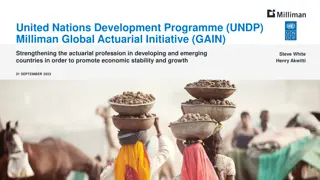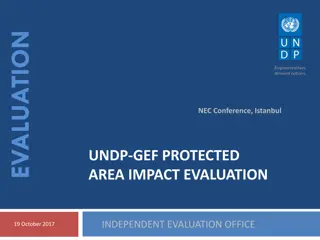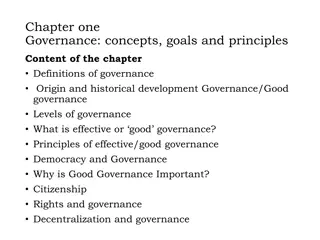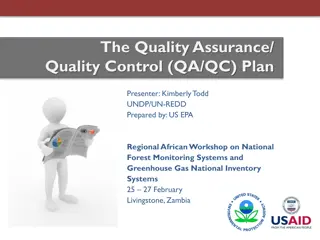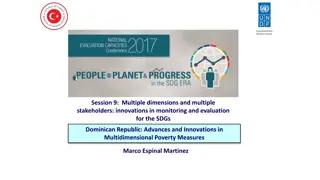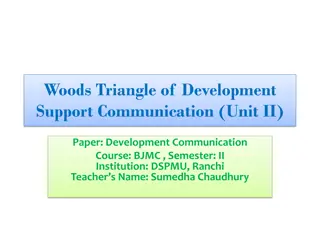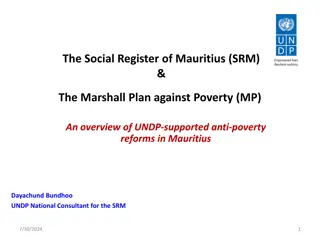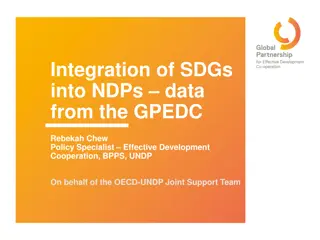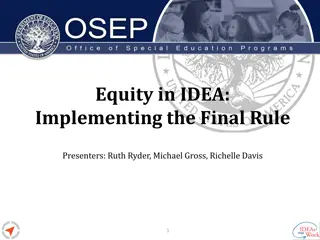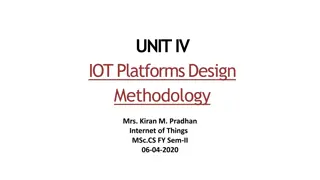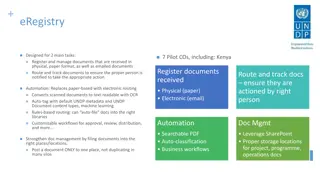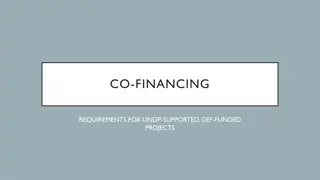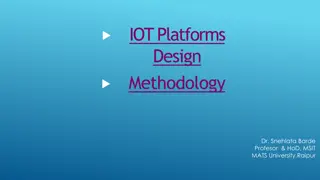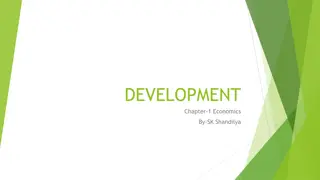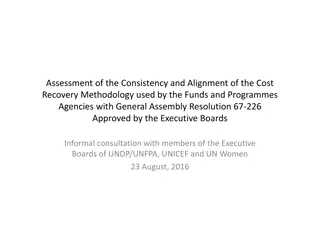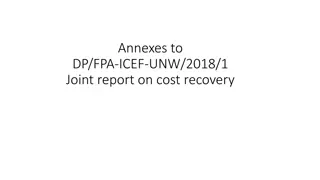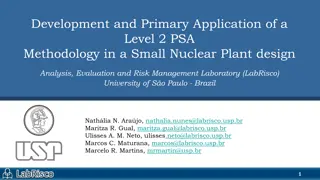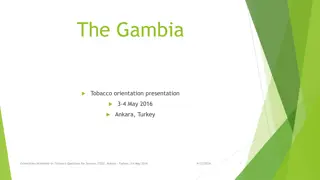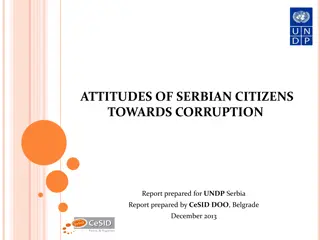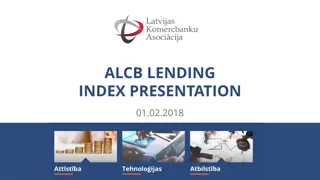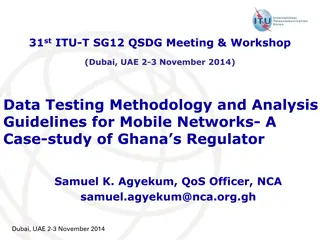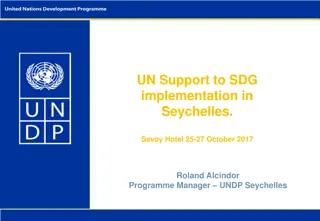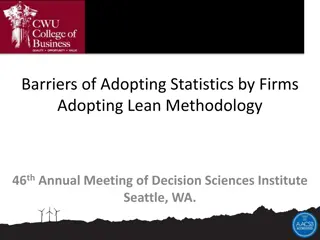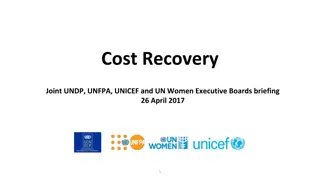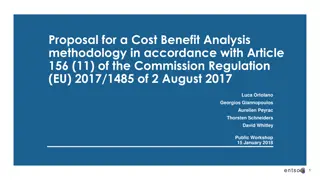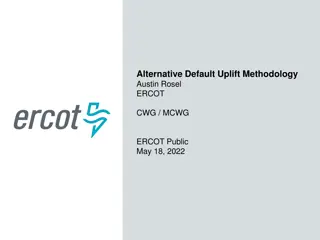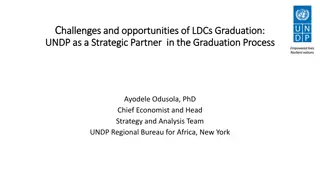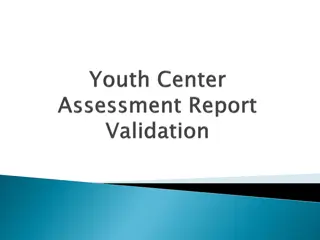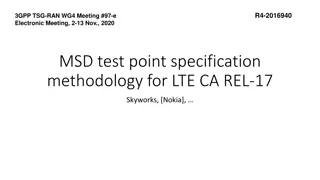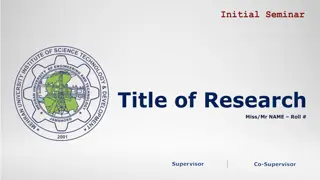Understanding Q-Methodology: A Stata Analysis Overview
Q-Methodology is a research approach focusing on subjective viewpoints. This article discusses the history, goals, and steps involved in a Q-methodology study using Stata programs. It covers the development of a concourse, creation of a Q-sample, Q-sorting activities, and analysis and interpretation
5 views • 46 slides
Milliman Global Actuarial Initiative (GAIN)
The United Nations Development Programme (UNDP) and Milliman Global Actuarial Initiative (GAIN) are working together to enhance the actuarial profession in developing nations, fostering economic stability, and growth. The initiative aims to promote risk protection mechanisms through insurance contri
5 views • 27 slides
Impact Evaluation of Protected Areas and Biodiversity Conservation Projects
This evaluation focuses on the impact of UNDP-GEF supported Protected Areas (PAs) across 137 countries since 1992. It includes analysis of forest change, species population, human interaction with PAs, capacity trends, and governance. The portfolio analysis covers 618 projects with over $12.3 billio
0 views • 12 slides
Understanding Governance: Concepts, Principles, and Importance
Governance encompasses decision-making processes involving stakeholders, impacting how people lead their lives. Various definitions from organizations like the World Bank and UNDP highlight governance as how authority is exercised, resources managed, and citizens participate in decision-making. Good
2 views • 158 slides
Understanding Quality Assurance and Quality Control in Inventory Development
This presentation by Kimberly Todd for UNDP/UN-REDD focuses on the importance of Quality Assurance (QA) and Quality Control (QC) plans in inventory work. It covers the purpose, overview, QA/QC components, and the differences between QA and QC. The content emphasizes the need for systematic review an
0 views • 18 slides
Innovations in Multidimensional Poverty Measures in the Dominican Republic
Explore the advancements in poverty measurement through a presentation focusing on the adoption of multidimensional poverty indices in the Dominican Republic. The session delves into various poverty measures used, including the Multidimensional Poverty Index (MPI) by UNDP, highlighting the country's
0 views • 22 slides
Enhancing Evaluation Capabilities in Mongolia for Agenda 2030
The Mongolian Evaluation Network in collaboration with UNDP is working to integrate the 2030 Agenda into national strategies and plans, establish institutional coordination mechanisms, align budgets, and enhance data monitoring systems. Key stakeholders including government agencies, NGOs, and inter
0 views • 9 slides
Understanding Woods Triangle of Development Support Communication
John L. Woods introduced the concept of Woods Triangle, emphasizing the interconnection between knowledge generators, political leaders, and development knowledge users. Development Support Communication, popularized by UNICEF and UNDP, plays a crucial role in linking various stakeholders involved i
6 views • 5 slides
Overview of Social Register of Mauritius and Marshall Plan against Poverty Reforms
The Social Register of Mauritius (SRM) is a crucial tool for registering and identifying the poor, aiding policy-makers in creating effective pro-poor policies. This overview of UNDP-supported anti-poverty reforms in Mauritius highlights the objectives and improvements brought about by SRM, addressi
0 views • 30 slides
Integration of SDGs into NDPs: GPEDC Data Analysis by Rebekah Chew
Explore the integration of Sustainable Development Goals (SDGs) into National Development Plans (NDPs) through data insights from the Global Partnership for Effective Development Co-operation (GPEDC). Rebekah Chew, a Policy Specialist at the BPPS, UNDP, presents key information on aligning country p
0 views • 15 slides
Equity in IDEA: Implementing the Final Rule Presentation
Recap the final rule on equity in IDEA, focusing on standard methodology, remedies, important dates, and addressing questions. Discuss the methodology requirements, including data collection on disproportionality and disciplinary actions. Explore the standard methodology components, like risk ratios
0 views • 49 slides
IoT Platforms Design Methodology for Efficient System Development
Designing IoT systems can be complex due to the interactions between various components like devices, network resources, web services, analytics, applications, and servers. This article presents a generic design methodology for IoT systems that is independent of specific products or services, leadin
2 views • 8 slides
Streamlining UNDP Document Management with eRegistry Automation
Revolutionize document processing at UNDP with eRegistry Automation, a robust system designed to streamline tasks such as document registration, routing, tracking, and classification. By automating tedious processes and enabling easy searchability, eRegistry enhances efficiency and accuracy in docum
0 views • 5 slides
Understanding Co-Financing Requirements for UNDP-Supported, GEF-Funded Projects
Co-financing for GEF-financed projects refers to additional resources provided by the GEF Partner Agency or other non-GEF sources to support project implementation and goals. The sources of co-financing include various entities such as bilateral aid agencies, foundations, governments, civil society
0 views • 8 slides
Role of International Health Agencies in Improving Global Healthcare
International health agencies play a crucial role in providing assistance to enhance medical care in developing countries. They offer expert advice, training, and resources to local health professionals, contributing significantly to healthcare delivery systems worldwide. Key agencies like WHO, UNES
0 views • 19 slides
IoT Platforms Design Methodology by Dr. Snehlata Barde - Overview
Designing IoT systems can be complex, but with a generic methodology like the one proposed by Dr. Snehlata Barde, designing, testing, and maintaining IoT systems becomes more efficient. The methodology focuses on purpose, requirements, process specification, domain model specification, information m
0 views • 9 slides
Overview of Development Economics and Goals
Development economics is a branch of economics that focuses on improving the economies of developing countries by targeting factors such as health, education, working conditions, and policies. It involves macroeconomic and microeconomic analysis to enhance domestic and international growth. Differen
1 views • 11 slides
Safeguards Information System Development in Zambia: Successes and Challenges
Zambia successfully implemented a Safeguards Information System (SIS) with the support of various partners and stakeholders. The process involved consultation, narrative reporting, and the creation of a web-based platform managed by the Forestry Department. While facing minimal challenges, ongoing i
0 views • 7 slides
M&E for REDD+ Implementation Stocktaking - UN-REDD Asia-Pacific
In this resourceful session by Bruno Hugel from UNDP in Bangkok, key aspects of Monitoring and Evaluation (M&E) for REDD+ implementation are covered, including developing results frameworks, setting up M&E systems, leveraging existing information systems, and integrating across all sub-systems for e
0 views • 5 slides
Assessment of Cost Recovery Methodology Alignment with General Assembly Resolution 67-226
This report assesses the consistency and alignment of the cost recovery methodology used by UNDP/UNFPA, UNICEF, and UN Women with General Assembly Resolution 67-226. Issues such as declining core funding, the need to avoid cross-subsidization, and the importance of full cost recovery are highlighted
0 views • 14 slides
A Handbook for Building National MPIs: Practical Guidance for Ending Poverty
This handbook provides detailed practical guidance on creating a technically rigorous permanent national Multidimensional Poverty Index (MPI). Jointly developed with UNDP, it aims to accelerate progress towards the Sustainable Development Goals by offering insights from countries' experiences in des
3 views • 18 slides
Report on Effective Cost Recovery Rates by UNDP for 2014-2017
The joint report on cost recovery by UNDP for the years 2014-2017 provides detailed evidence and analysis of the effective average cost recovery rates, compliance with cost recovery policy, and calculations based on financial information. The report highlights contributions from various sources, inc
1 views • 23 slides
Development and Primary Application of Level 2 PSA Methodology in Small Nuclear Plant Design Analysis Lab
The study at the LabRisco in University of São Paulo, Brazil focuses on developing and applying a Level 2 Probabilistic Safety Assessment methodology for a small nuclear plant design evaluation. The work entails identification of severe accident scenarios, analysis of nuclear systems, and construct
0 views • 17 slides
Tobacco Questions for Surveys Workshop Overview in Ankara, Turkey
This presentation outlines the Orientation Workshop on 'Tobacco Questions for Surveys (TQS)' held in Ankara, Turkey. It covers topics such as tobacco data overview, smoking initiation among Gambian adolescents, survey methodologies, and the Integrated Household Survey (IHS). The workshop aimed to pr
0 views • 12 slides
UNDP Don't Choose Extinction Campaign Playbook & Assets for Social Channels
UNDP has launched the Don't Choose Extinction campaign with a comprehensive playbook and content calendar to support the initiative across social channels. The campaign includes assets, delivery schedules, platform guides, and regional alignment strategies, aiming to deliver a unified message to com
0 views • 19 slides
Citizen Attitudes Towards Corruption in Serbia: A 2013 Report
Report prepared by CeSID DOO for UNDP Serbia in December 2013 delves into Serbian citizens' attitudes towards corruption, financial situations, and key problems. Findings reveal a mixture of optimism and concern among citizens regarding the direction of the country, highlight financial struggles fac
0 views • 27 slides
Workshop on New Approaches to Statistical Capacity Development in Lao PDR
This workshop, hosted by PARIS21 and UNDP, focuses on enhancing statistical capacity development in Lao PDR. It covers topics like successful capacity development programs, partnerships for national statistics development, and prioritizing needs versus international requirements. The Lao Statistics
0 views • 15 slides
Evaluation of UNDP Support to Conflict-Affected Countries in Integrated Peace Operations
This evaluation conducted by the Evaluation Office of UNDP in May 2013 assesses how UNDP's programming supports peacebuilding in conflict-affected countries. It focuses on UNDP's role in transitioning countries from immediate post-conflict to development stages and evaluates the effectiveness of res
0 views • 12 slides
ALCB Lending Index Presentation & Methodology Overview
Explore the ALCB Lending Index Presentation held on 01.02.2018, including methodology, results, and discussions on lending for economic growth. Discover the index development process, methodology, and factors impacting banks' ability and desire to lend, as well as borrowers' ability and desire to bo
0 views • 14 slides
Data Testing Methodology and Analysis Guidelines for Mobile Networks - A Case Study
Presentation outlining a data test measurement system for mobile networks, focusing on methodology, hardware components, measurement profiles, configuration, and analysis guidelines. The case study of Ghana's Ashanti Region is discussed, highlighting the test methodology and configuration specificat
0 views • 22 slides
UNDP Support to SDG Implementation in Seychelles - Initiatives Overview
UNDP has been actively supporting the implementation of Sustainable Development Goals (SDGs) in Seychelles through various workshops, awareness campaigns, and strategic partnerships. Initiatives include prioritization workshops, integration of SDGs into national development, and launching a Creole b
1 views • 17 slides
Lean Six Sigma Methodology for Business Excellence
Lean Six Sigma methodology offers a strategic approach to optimize business processes, reduce costs, enhance quality, and improve customer satisfaction. This efficient methodology focuses on eliminating waste and defects to drive revenue growth and profitability for organizations. With a background
0 views • 27 slides
Joint UNDP, UNFPA, UNICEF, UN Women Executive Boards Cost Recovery Briefing
Briefing on cost recovery for the joint Executive Boards of UNDP, UNFPA, UNICEF, and UN Women, covering topics such as feedback on cost recovery, role of core resources, cost recovery models using a LEGO approach, harmonization efforts, guidance for Executive Boards, and next steps towards proposing
0 views • 42 slides
Cost-Benefit Analysis Methodology as per EU Regulation 2017/1485
This proposal outlines a comprehensive Cost-Benefit Analysis (CBA) methodology in line with Article 156(11) of the Commission Regulation (EU) 2017/1485. The methodology is designed to address the requirements for Frequency Containment Reserve (FCR) and Limited Energy Reservoirs (LER) within the regu
0 views • 64 slides
SPC.CS Coil Design and Analyses: Requirements, Assumptions, and Methodology
This document discusses the design and analysis of SPC.CS coil, focusing on maximizing magnetic flux, survival under fatigue conditions, and materials used for different field layers. It covers requirements, assumptions, and the methodology for uniform current density solenoid design. The study aims
0 views • 15 slides
Analysis of Default Uplift Methodology Changes in ERCOT
This document delves into the impact of changes to the Default Uplift Methodology in ERCOT, focusing on the removal of CRR Auction activity and the multiplication of CRRs owned. It explores scenarios with varying multipliers at different levels, revealing potential implications for QSEs, CRRAHs, and
0 views • 10 slides
Challenges and Opportunities of LDCs Graduation: UNDP's Role
Overview of the challenges and opportunities faced by Least Developed Countries (LDCs) in the graduation process, highlighting the criteria, countries already graduated, and those scheduled for graduation. The presentation discusses the role of UNDP as a strategic partner in supporting LDCs through
0 views • 12 slides
Capacity Assessment and Development Plan for Youth Centers in Liberia
The capacity assessment covered various youth centers across Liberia, focusing on organizational, technical, and institutional capacities. The methodology involved mobilizing stakeholders, conducting situational analyses, and developing a capacity development plan. Key findings highlighted governanc
0 views • 21 slides
Evolution of LTE-CA Test Point Specification Methodology for Release-17
The current LTE-CA MSD test point methodology in LTE releases results in specifying redundant test points. Adopting the NR Way of Working for LTE-CA in Release-17 could simplify the MSD tables, reduce complexity, and cut conformance test time/cost. The proposal aims to prevent further expansion of L
0 views • 7 slides
Research Framework and Methodology in Science, Technology, and Humanities
This study delves into developing a robust research framework and methodology in the fields of science, technology, and humanities. It covers literature review, research gap identification, formulation of research questions and objectives, theoretical framework description, and research methodology
2 views • 13 slides
